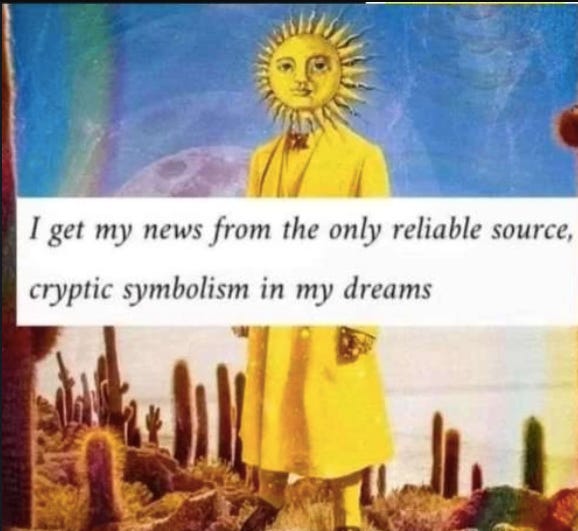Notes on Gnosis
trusting your own wisdom
Today’s newsletter will be a bit different than my previous entries. It will be a first in my series on gnosis, or our god-given ability to witness the truth of the world with our own eyes— wisdom through experience, through our very bodies and heart-minds. Gnosis, for me, is the foundation of my spiritual, creative, magical and embodied practice. It is the first step to interacting with spirits, communing with plants and animals, feeling for yourself that the world is alive and speaking, though perhaps in a different tongue than we humans are used to.
This newsletter is for anyone who wants to enhance their self trust, expand their knowledge of astrology, divination, the numinous, etc beyond what has been written about in books (which, I will remind you, only encompasses a fraction of the world’s wisdom).
This newsletter is for anyone who wants their very life to be a portal of deep knowing that cannot be taken away.
I first learned of the concept of gnosis through a study of the Gnostics. This since-extinct sect of early Chrisianity and Judaism came about in the early 1st century A.D. in the Mediterranean region. In the larger Christian landscape, Gnosticism conflicted with the Orthodox tradition, the dominant strain of Christianity today, because it believed each person could achieve direct knowledge of god and the divine. This is what gnosis means: wisdom not through book-learning or the mediation of the clergy but through one’s own experience. It challenged the hierarchical Christianity that spoke of sin and repentance and only saw salvation through some outside source, which, conveniently, placed priests in the center, hoarding and reifying their power alone to commune with the divine. When one did not follow the commandments or rules set out by those in power, one was a sinner, at risk of going to hell for one’s transgressions. Rather than seeing humans as so wicked, the Gnostics, like Buddhists, spoke of illusion and enlightenment rather than good and evil. Sinning was not an indicator of some inner rot but merely what happened when you turned away from divine truth.
You are not bad for “sinning” by this definition, just hurting and deceiving yourself, which my god, at the very least, does not prefer.
I think of this line from Jesus, not recorded in our current bible but found in the suppressed Gnostic Gospel of Thomas:
If you bring forth what is within you, what you bring forth will save you. If you do not bring forth what is within you, what you do not bring forth will destroy you.1
This quote has stuck with me because I see its truth play out again and again in my own life. If there is a part of me that I am trying to ignore or decide I cannot possibly be or contain, I will spend all of my time trying to control it, collapsing the rest of my personality around avoiding it.
Jerrod Carmichael on Tyler the Creator’s album Igor put it another way: “What you run from, you end up chasing”.
I am also reminded of this quote from poet Fanny Howe, that I think speaks to more deeply to this dynamic of suppression and control. In “The Winter Sun,” she compares our growth from childhood to adulthood to a larval cycle. The formation of our relationship to the world (for some of us) is experienced as an unfolding; it imitates the material cycle of larva, pupa, cocoon: “It begins as if at the egg, blind and bound, and in its infancy discovers light and a trail”.2 We begin knowing little of this world and as time goes on, we begin to see traces of light, which lead us down a certain path. In order to grow, Howe continues, “the creature must shuck, melt and bend those figures into malleable functions if it is to break out of its buglike condition and head for the light”.3 We must, in other words, turn our particularities and limits into supple tools that allow us to, paradoxically, escape those exact limits and reach beyond our small self.
This means not excising or forsaking any past self and its attendant flaws: “If it can retain all its cycles as layers of knowing that can be accessed throughout its life and not crush or dry them up one by one, it will live in the green of the natural world. It will be what’s called a free spirit”(emphasis mine).4 Free to see the world as it is, free to be whomever it is meant to be.
In other words, our salvation lies in getting familiar with what we actually are, where we have been, in it all messy glory. Our wisdom and light come to meet us not in some far-off idealized future or fabricated version of ourselves but here and now. If we continually try to block or cut off some part we deem unacceptable, we “will only survive as a self locked into the dense furniture of sense and tradition, like one blinded by fear”. From blindness comes lack of light, lack of seeing the truth right before our eyes.



